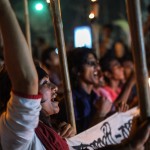Motiur Rahman Nizami, the Jamaat-e-Islami chief of Bangladesh, was sent to the gallows in Dhaka Central Jail at midnight on 11 May 2016. Charged with war crimes that include genocide, torture, and rape during the Bangladesh Liberation War of 1971, he was also convicted of leading a militia that helped the Pakistani army stage the mass killing of top intellectuals during the war. He was the supreme commander of Al-Badr, an anti-liberation militia group. After independence, many members of the militia, including Nizami, became leaders of the Jamaat, an Islamic political outfit.
The trial and execution has sparked criticism from some quarters. Pakistan has labelled Nizami as the victim of a political vendetta while others, including Human Rights Watch and Amnesty International, have described it as a trial that fell short of international fair trial standards. The execution comes against the surge of violence, allegedly by Islamic extremists, against some atheist bloggers, academicians, members of religious minorities, and foreign aid workers, which has widened the split in Bangladesh between secularists and some religious activists.
With the possibility of the Jamaat being officially banned through a resolution to be adopted in the Bangladesh parliament, the larger question remains as to what will happen to its followers and activists. Will the outfit cease to exist as a political and ideological force or, in the absence of a political platform, will its ideological followers strive to find alternate ways to make their existence felt?
Will their presence be felt in some other form of an alternate political identity, or will some zealots be taking the route of destabilising the country, as with the recent spate of assassinations and attacks?
These are a few of the questions that loom large in the political landscape of Bangladesh, in the wake of the hanging the Jamaat-e-Islami chief. Some are of the opinion that the new generation Jamaat leaders of Jamaat, i.e., those born after the 1971 war and untainted by the war crime atrocities, will take up Nizami’s mantle and redefine the mandate and charter of the religious political outfit. The Jamaat has been a well-funded organization, with a well-entrenched resource base both within and outside the country, including a number of well-established financial and commercial outfits owned by it. How these assets will play out in the larger scheme of things also needs to be seen.
The loose factions are still at large. There is speculation that, along with foreign Islamic extremists groups, they can conceive new strategy to regain lost ground. While the government, for the time being, seems to have managed to keep things under control—-even the hartal called today by the Jamaat in protest against the hanging of Nizami was uneventful—-the clouds of uncertainty and anxiety still float around in national life. Unchartered territories are being traversed in the wake of the hanging of the architect of the war crimes as well as the killing spree unleashed by the lone wolfs, on atheists, LGBT, and minorities. Whether they are acting alone, or are part of an unfolding scheme of things, remains to be seen.
Prof. Syed Munir Khasru is Chairman of the think tank The Institute for Policy, Advocacy, and Governance (IPAG).
This article was exclusively written for Gateway House: Indian Council on Global Relations. You can read more exclusive content here.
For interview requests with the author, or for permission to republish, please contact outreach@gatewayhouse.in.
© Copyright 2016 Gateway House: Indian Council on Global Relations. All rights reserved. Any unauthorized copying or reproduction is strictly prohibited


